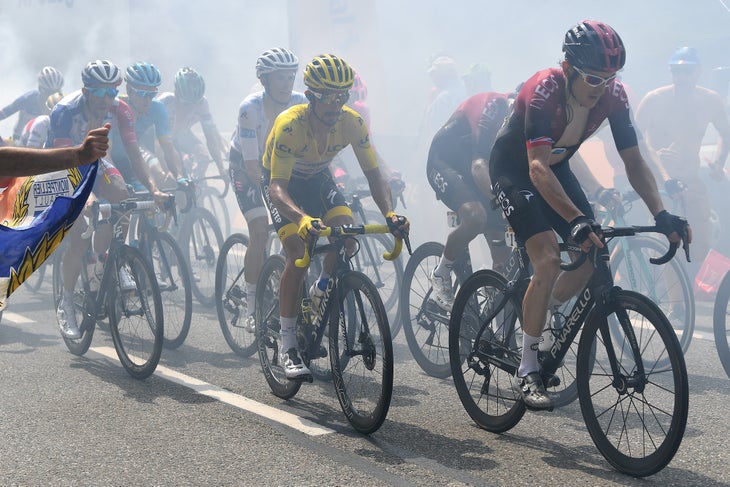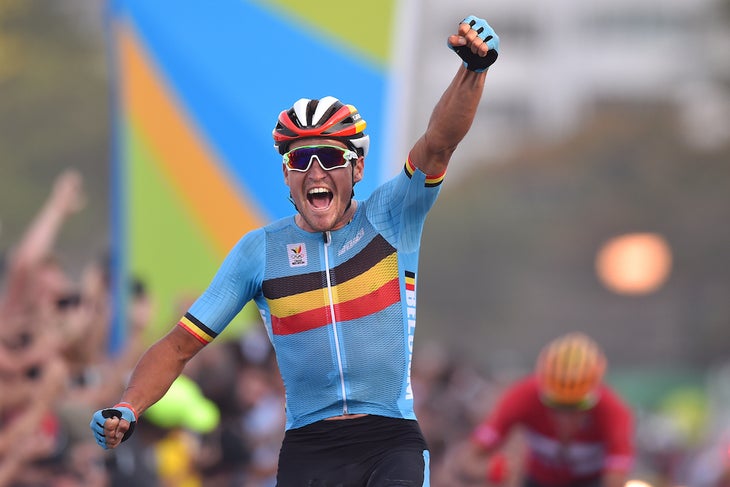A climb-heavy elite men’s Olympic road racing course on tap for the 2020 Tokyo Olympics is already reverberating across the peloton.
The challenging route, featuring hard climbs in the shadow of Mount Fuji, is so enticing for grand-tour style riders that many are already reshuffling their respective calendars for a rare shot at the Olympic gold medal.
Big names such as Vincenzo Nibali, Alejandro Valverde, and Romain Bardet are already bypassing the Tour de France, in part because the Olympic course is so inviting. Others are building their seasons around peaking not for July and the Tour de France, but rather for a shot at the Olympic gold medal in August.
“The Olympics complicate everything next year,” said Jumbo-Visma’s George Bennett. “It’s a once-in-a-lifetime course for a lot of riders, so there will be a lot of discussion of what the best way to approach the race.”
In fact, those discussions are happening right now. Team managers and sport directors are huddling in staff meetings across Europe ahead of the traditional round of mid-December training camps to spell out the racing calendars for the peloton’s top stars.
If there was already excitement building around the Tokyo route — and controversy when the women’s course was shorter and bypassed some of the hardest climbs — that’s grown to a fever pitch after many top pros had a chance to preview the course in person.
Riders attending the Saitama critérium last month in Japan carved out some time to do a first-hand course inspection. They walked away impressed.
“I really liked it,” Denmark’s Jakob Fulgsang told MARCA. “Only a climber could win it. It’s going to be my big objective next year, ahead of any grand tour or other race. It’s very good for me.”
That sentiment is echoing across the peloton as riders and teams consider how to plot out their respective racing calendars.
That decision-making process was made even more complicated after race organizations revealed the routes for the upcoming grand tours. The Giro d’Italia has the look of an old-school grand tour route, with three time trials and a demanding final week. The Tour de France, in contrast, is offering a novel, explosive route packed with climbs that will require absolute concentration and fitness for three weeks.
Another factor is the date of the elite men’s road race, set for Saturday, July 25. That leaves less than a week for racers coming off the Tour de France to try to recover from a full month’s of racing, and then travel to Japan and try to regroup ahead of the demanding race.
The big question making the rounds right now is to whether to race the Giro and have several weeks to recover and fine-tune form ahead of the Olympics, or race the Tour and hope to hold on to the vapors of top form for another week.
“Many riders are trying to decide what’s the best way to go,” Bennett said of the Giro-or-Tour quandary. “For me, it’s hard because the Giro is not the best course for me, and the Tour is ideal. There are only six days from the end of the Tour to the Olympics. It’s not an easy decision. The staff is trying to put together everyone’s calendar right now.”

Having the Olympics so close to the end of the Tour de France will also have an impact on the GC fight for the yellow jersey. A few riders who normally would be considered a favorite for the overall might still race the Tour, but give up on the GC to save something for the Olympics. Julian Alaphilippe, the charismatic Frenchman who held yellow for two weeks in July, has already indicated the Olympics take precedent over the yellow jersey for 2020.
The allure of the yellow jersey is so strong that riders such as Chris Froome or Primoz Roglic will undoubtedly ride to win in July, but even they will be looking to save as much energy as possible to try to wiggle out a victory in France and save something for Tokyo.
This growing quandary reveals how the prestige of the Olympic Games has slowly but surely taken hold over the peloton. When the Games were first opened up to professional cyclists in 1996, many of the pros at the time still considered the Games as a secondary objective. The thinking was it was great if you won, but it was more important to perform well at the Tour de France than to put the Olympics as a priority.
Victories by such riders as Samuel Sánchez and Greg Van Avermaet, who enjoyed wider popularity as an Olympic champion than anything they ever achieved on the road, has helped to change how many in the peloton look at the Olympics. Plus, an entirely new generation has come of age in the peloton where racing the Olympics was not just a novelty every four years, but rather a singular objective.

The mountainous and challenging Tokyo course is impacting the calendar in other ways as well. It’s so hard that perennial one-day contenders like Peter Sagan or Alexander Kristoff have all but written off their chances of victory.
And the Vuelta a España will also be impacted. Riders who might race both the Tour and Vuelta, especially among the GC contenders, will have a hard time trying to fit in recovery and altitude training ahead of the Spanish grand tour if they race the Tour and Olympics in a row.
No matter how they approach the Olympics, riders say the Tokyo course should see a race worthy of Olympic status.
“The Olympics are a big goal for me next season,” Bennett said. “Everyone in the peloton is talking about [Tokyo]. It’s a once-in-a-lifetime chance to be Olympic champion. It’s going to be a huge opportunity.”
After all, who wouldn’t want to be Olympic champion? It appears almost everyone in the peloton right now is plotting their chances.
